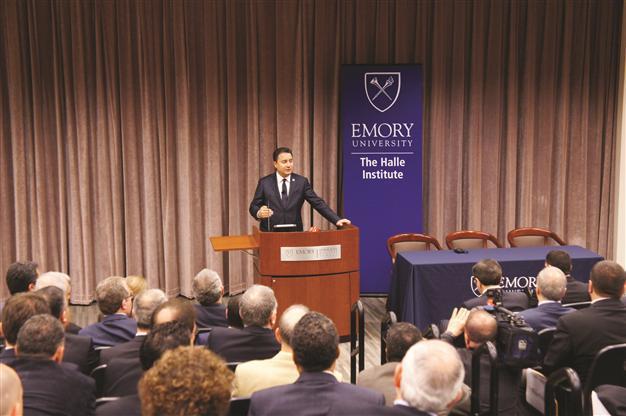Turkey plans to lure back capital deposited abroad
ISTANBUL

Deputy PM Babacan has been in the United States for Turkey Investment Week. He gave a speech at Emory University in Atlanta.
Turkey’s Finance Ministry is working on a new cash repatriation regulation to draw back $130 billion worth of citizens’ money abroad amid the country’s increasing luster in the world, Deputy Prime Minister Ali Babacan has said.A cash repatriation law designed to bring assets home came into force in 2008 during the beginnings of the global economic crisis, Babacan said, but added that a similar could be considered once more.
“When we enacted the first one, there was an economic crisis in the world. Turkey had not yet become prominent. Cash repatriation will be more effective in this period [thanks to Turkey’s greater prominence in world affairs],” Babacan said during a visit to Atlanta on April 16.
Under the 2008 cash repatriation law, a 2 percent tax was applied on assets coming in from abroad, together with a 5 percent tax on assets in the country, Babacan said, adding that they were now working on a new tax rate. Finance Minister Mehmet Şimşek confirmed yesterday that they had started work on the cash repatriation law under the direction of Prime Minister Recep Tayyip Erdoğan.
But main opposition Republican People’s Party (CHP) General Vice President Faik Öztrak, who opposes the cash repatriation, said in a written statement yesterday that the new law would facilitate money laundering.
“Will the AKP [ruling Justice and Development Party] make peace with those who mix fair and unfair money?” Öztrak said, musing whether it was one of the conditions of the negotiations between Erdoğan and jailed outlawed Kurdistan Workers’ Party (PKK) leader Abdullah Öcalan.
“As Parliament made a law on preventing money laundering in February, will it make a new law to launder money now?” he said, questioning whether it would be possible to determine which money came from drug trafficking, bribery, the arms trade or terrorism.
The cash repatriation law came into force in 2008 with the aim of “creating resources for investments that can resolve production, employment and inflation issues, maintain economic revival, provide financial resources to overcome the global economic crisis with minimum damage and reinforce enterprises’ capital structures.
According to the law, real and corporate person’s financial instruments (money, exchange, gold and other capital market instruments) abroad and property abroad will be declared and registered and repatriated to the national economy. Instruments in the country that are not listed as equity capital by enterprises must also be declared and used as capital in order to reinforce the capital structure.
More than $50 billion of the total registered assets abroad worth $130 billion is traded on the Unites States Treasury securities, said Babacan, who visited the U.S. with a delegation of the Union of Chambers and Commodity Exchanges of Turkey (TOBB) for Turkey Investment Week. Babacan said the U.S. Chamber of Commerce had 3 million members, adding that Turkey needed to draw the attention of U.S. business leaders.
The deputy prime minister also said the U.S. Chamber of Commerce planned to bring a procurement committee to Turkey. “U.S. investors that have $3 trillion are looking to make foreign investments. We’d like to take a share of these investments.”
















